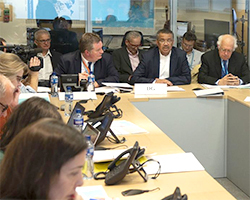2019-nCoV outbreak is an emergency of international concern

WHO/C. Black
The WHO Director-General, Dr Tedros Adhanom Ghebreyesus, declared the novel coronavirus (2019-nCoV) outbreak a public health emergency of international concern (PHEIC) on 30 January 2020. This is the 6th time WHO has declared a PHEIC since the International Health Regulations (IHR) came into force in 2005.
The Director-General accepted the advice given by the IHR Emergency Committee, which had reconvened on 30 January. The advice includes temporary recommendations for China, other countries and the global community.
By declaring the outbreak a PHEIC, WHO has emphasized the urgent need to coordinate international efforts to investigate and better understand 2019-nCoV, to minimize the threat in affected countries and to reduce the risk of further international spread. “We are all in this together and we can only stop it together,” the Director-General emphasized.
What happens when a PHEIC is declared?
Declaring a PHEIC will ensure continued support to the response in China and accelerated preparedness in all countries.
When a PHEIC is declared, the Director-General issues temporary recommendations under the IHR (2005), including obligations for countries to provide sufficient public health rationale and justification to WHO about any additional measures beyond what WHO recommends. This is critical to ensure the international response is evidence-based, measured and balanced, so that unnecessary interference with travel and trade is avoided.
The PHEIC also enhances global coordination, cooperation and solidarity. It increases transparency and support to countries with weaker health systems, and accelerates research and development of vaccines, therapeutics and diagnostics.
Temporary recommendations for all countries
In addition to temporary recommendations to China to continue its robust response, the WHO Director-General issued temporary recommendations under the IHR (2005). All countries should be ready to contain any introduction of the virus and its spread through active surveillance, early detection, isolation and case management, contact tracing, and prevention. They should also be ready to share full data with WHO.
Countries should place emphasis on:
- reducing human infection, and prevention of secondary transmission and international spread;
- contributing to the international response through multisectoral communication and collaboration;
- participating actively in increasing knowledge on the virus and the disease;
- advancing research.
Recommendations for the global community
As this is a new coronavirus, the global community should continue to demonstrate solidarity and cooperation. Such cooperation entails supporting each other to:
- identify the source of the new virus
- determine its full potential for human-to-human transmission
- prepare for potential importation of cases
- conduct research on therapeutics and vaccines.
The global community should also provide support to low- and middle-income countries in their response to this event, and facilitate their access to diagnostics, potential vaccines and therapeutics.



